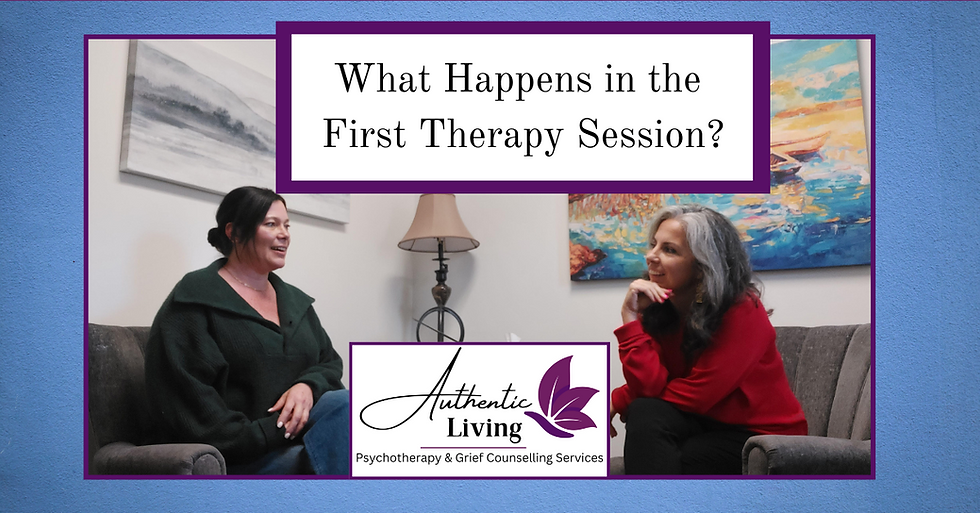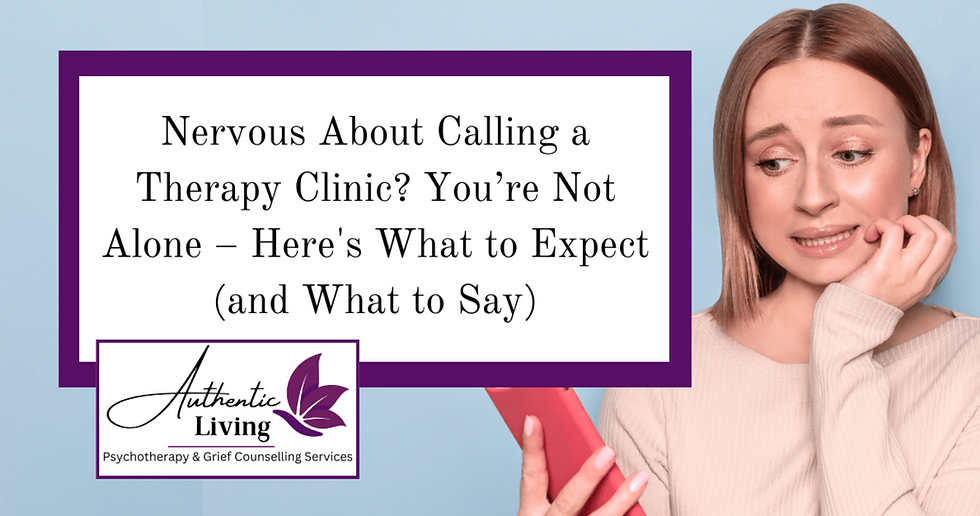What is Grief Counselling and How Can It Help Me? Plus, Some Surprising Benefits of Grief Counselling
- Aug 13, 2025
- 6 min read
Updated: Aug 18, 2025
Grief is a natural and deeply personal response to loss. While it is something everyone experiences in their own way, it can sometimes feel overwhelming, confusing, and isolating. Grief counselling is a form of therapy designed to help you navigate the emotional, mental, and physical challenges that often come after losing someone or something significant in your life.
Whether your loss is recent or happened years ago, grief counselling offers a safe and compassionate space to talk openly about your feelings, process your experiences, and find ways to move forward while still honouring your loss.

What is Grief Counselling?
Grief counselling is a type of psychotherapy focused on supporting people through bereavement and other forms of loss. This might include the death of a loved one, the end of a relationship, loss of health, job loss, or other significant life changes.
A grief counsellor is trained to:
Listen without judgment
Help you make sense of your emotions
Provide tools and coping strategies
Guide you in adjusting to life after loss
How Grief Counselling Can Help
Grief affects more than just your emotions; it can impact your thinking, physical health, relationships, and sense of self. Counselling addresses all of these areas so you can better cope with the many layers of grief.
Here are some ways grief counselling can help:
Providing a Safe Space to Talk: Friends and family may want to help but might not fully understand what you are going through. In counselling, you can express your feelings openly without worrying about being judged or told to “move on.”
Normalizing Your Experience: Many people fear they are grieving “wrong” or that their feelings are abnormal. A counsellor can reassure you that your reactions are valid and help you understand the grieving process.
Developing Healthy Coping Strategies: Grief can feel overwhelming and may lead to unhealthy coping, such as withdrawal or numbing your emotions. Counselling helps you find ways to cope that support your healing.
Managing Complicated Grief: Sometimes grief feels stuck or becomes more intense over time. This is called complicated grief, and a therapist can help you work through these deeper struggles.
Rebuilding Your Life: Counselling can help you re-engage with life, explore new possibilities, and carry your loved one’s memory forward in a meaningful way.
What Happens in a Grief Therapy Session
A grief therapy session is a safe, supportive space where you can talk openly about your loss without fear of judgment. In your first session, your therapist will usually start by getting to know you and your unique experience with grief. They may ask about the person or situation you are grieving, the emotions you have been feeling, and the ways your loss has affected your daily life.
From there, sessions often focus on helping you process your emotions, make sense of your loss, and find healthy ways to cope. This could include exploring memories, discussing changes in your relationships, identifying triggers that bring up strong feelings, and learning strategies to manage overwhelming emotions. Your therapist may also guide you through exercises to help you express grief in creative or meaningful ways, such as writing, mindfulness, or visualization.
Grief therapy is always a collaborative process. If you are not comfortable with a suggested activity, your therapist will work with you to find an alternative exercise or a different topic to discuss that still supports your healing. The focus is on creating a space that feels safe, respectful, and adapted to your needs.
Importantly, grief therapy is not about “getting over” your loss, but about finding a way to live with it while honoring your connection to what you have lost. Each session moves at your pace, allowing you to share as much or as little as you feel ready for.
Is Grief Counselling Right for Me?
Grief counselling can be beneficial if you:
Feel stuck in your grief or unable to function day-to-day
Struggle with overwhelming sadness, guilt, anger, or numbness
Avoid people or activities you once enjoyed
Want help adjusting to a new reality after loss
There is no “right time” to seek counselling; you can start soon after a loss or years later.
Who Grief Counselling Might Not Be Right For
While grief counselling can be very helpful for many people, it is not the best fit for everyone. Some individuals may be seeking a quick “fix” for their grief; however, grief is a natural process that cannot be rushed or erased. If you are not ready to talk about your loss, or if you are being pressured into therapy by someone else rather than wanting it for yourself, counselling may feel unhelpful at this time.
Grief counselling is also not a substitute for urgent crisis intervention. If you are experiencing thoughts of self-harm or suicide, or are in a state of extreme emotional distress that makes it hard to stay safe, it is important to reach out to crisis services or emergency support first.
In addition, some people may benefit more from different therapeutic approaches if their struggles are less about grief itself and more about other mental health conditions such as severe depression, PTSD, or substance use issues. In these cases, grief counselling can still be part of the healing journey, but it may need to be combined with other forms of treatment. Thankfully, all of our grief counsellors are also therapists who can help with other issues.
The Surprising Benefits of Grief Counselling
Grief counselling is often thought of as a space to simply talk about loss and process sadness, but its benefits go far beyond emotional release. While everyone experiences grief differently, therapy can help transform the way you live and cope after loss, supporting not just your mental health, but your physical, social, and spiritual well-being.
1. Improved Emotional Resilience
Grief counselling teaches you strategies to manage overwhelming emotions, helping you navigate waves of sadness, anger, or guilt with more ease. Over time, this strengthens your overall emotional resilience, making it easier to face life’s future challenges.
2. Better Physical Health
Unprocessed grief can affect your body, contributing to fatigue, sleep disturbances, and weakened immunity. Working with a grief counsellor helps release stress, normalize your sleep patterns, and restore balance to your nervous system, which can improve overall physical health.
3. Enhanced Relationships
Grief often changes the way we relate to others. Counselling can help you communicate your feelings more openly, understand changes in your relationships, and build deeper, more authentic connections with friends, family, and partners.
4. Greater Self-Awareness
Therapy encourages reflection on your thoughts, values, and emotional patterns. This self-awareness can reveal new insights about yourself, your coping mechanisms, and what truly matters to you — fostering personal growth even in the midst of loss.
5. Spiritual and Existential Support
Grief can bring questions about meaning, purpose, and life itself. Counselling provides a safe space to explore these questions, helping you find or restore a sense of connection, meaning, and hope beyond the immediate pain of loss.
6. Practical Coping Tools
Beyond emotional support, grief counselling provides concrete strategies to manage triggers, navigate milestones, and create rituals or routines that honor your loved one while supporting your healing journey.
7. Prevention of Complicated Grief
Seeking support early can help prevent grief from becoming prolonged or overwhelming. Counselling equips you with tools to process loss healthily, reducing the risk of chronic sadness, depression, or anxiety.
Grief counselling is not just about mourning; it’s about learning to live fully again, even after profound loss. By addressing the emotional, physical, social, and spiritual impacts of grief, therapy can help you reclaim energy, purpose, and connection.
Grief Counselling at Authentic Living London
At Authentic Living London, we believe that grief is not something to be fixed; it’s something to be supported. Our therapists, many of whom have lived experiences with
loss, approach grief with compassion, understanding, and respect. We create a space where you can explore your feelings, share your story, and find tools to live authentically after loss.
Whether you are dealing with a recent loss, long-standing grief, or the anticipatory grief of knowing a loss is coming, we are here to walk with you through it.
Grief Counselling London ON, psychotherapy London Ontario, psychotherapist, therapist near me, grief therapy, complicated grief, prolonged grief disorder, anticipatory loss, anticipatory grief.











Comments